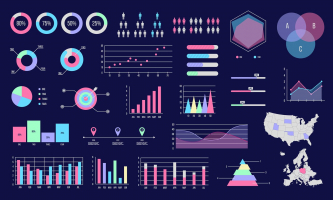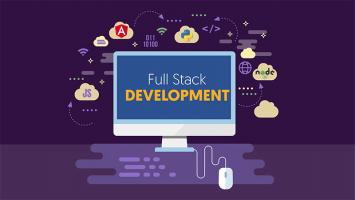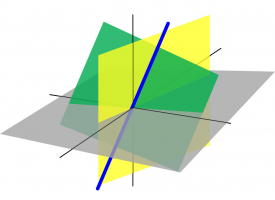Top 13 Best Online Data Structures and Algorithms Courses
Programming has always been a highly sought-after ability for software developers, and it is becoming much more so as technology advances. Data structures and ... read more...algorithms are the ultimate building blocks of programming. They are extremely valuable in tackling complex real-world situations. That is why, when interviewing for technical employment, tech behemoths like Google, Facebook, Microsoft, Amazon, and the majority of product-based organizations prioritize testing a candidate's mastery of algorithms and data structures. A solid understanding of data structures and algorithms increases problem solving abilities and is essential for becoming a successful programmer. Follow the list of top 13 best online Data Structures and Algorithms courses.
-
Princeton University is offering a free two-part algorithm course series. Both courses have gotten a 4.9 out of 5 rating from students, making them one of the highest ranked algorithms courses on Coursera. The courses cover algorithms and data structures, with an emphasis on applications and scientific performance analysis of Java implementations. Despite the fact that the concepts are language neutral, the solutions and implementations are written in Java.
- Algorithms, Part I – It covers elementary data structures (like linked lists, stacks, queues, binary heaps, and hash tables etc.) and sorting & searching algorithms (like binary search, quicksort, mergesort, insertion sort, selection sort, shellsort etc.)
- Algorithms, Part II – It focuses on graph and string processing algorithms and more advanced concepts used in application development. It covers undirected graphs, directed graphs, minimum spanning tree problem, shortest-paths problems, maximum flow and minimum cut problems and algorithms used for solving these problems.
Kevin Wayne and Robert Sedgewick, the professors for these courses, are widely regarded authors and presenters. Robert Sedgewick and Kevin Wayne co-wrote the Algorithms book, which is one of the greatest publications for learning Data Structures and Algorithms in Java.
This lecture series focuses on algorithm understanding through implementation and testing. It assumes students have a basic understanding of Java and expects all programming tasks to be submitted in Java. All course materials, including graded assignments, are free, and no certificate is awarded upon completion of the courses.Key Highlights
- Top free course on algorithms with an average rating of 4.9 and more than 671000 student enrolments
- Learn to analyze the performance of algorithms using scientific methods
- Explore various applications of stacks and queues ranging from parsing arithmetic expressions to simulating queueing systems
- Discuss application of sorting to computing the convex hull via the Graham scan algorithm
- Learn B-trees that are widely used to implement file systems
- Learn about core data structures and algorithms used in everyday applications and understand the trade-offs ivolved with choosing each data structure along with traversal, retrieval, and update algorithms
- Study and implement several classic data compression schemes
Duration : 6 weeks, 8-10 hours per week
Google Rating : 4.9/5.0
Enroll here: coursera.org/learn/algorithms-part1
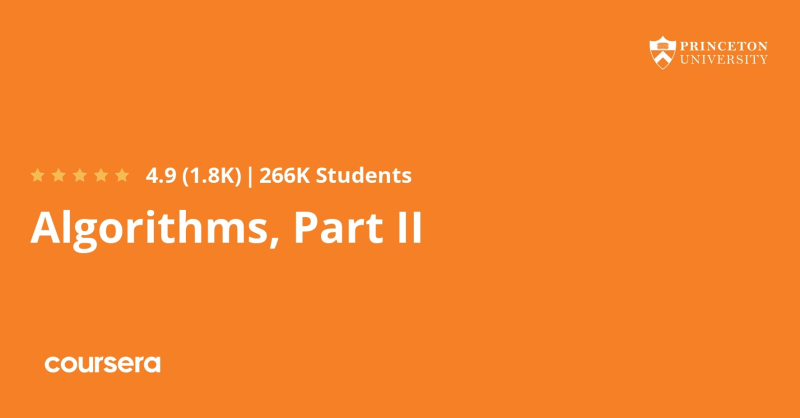
coursera.org 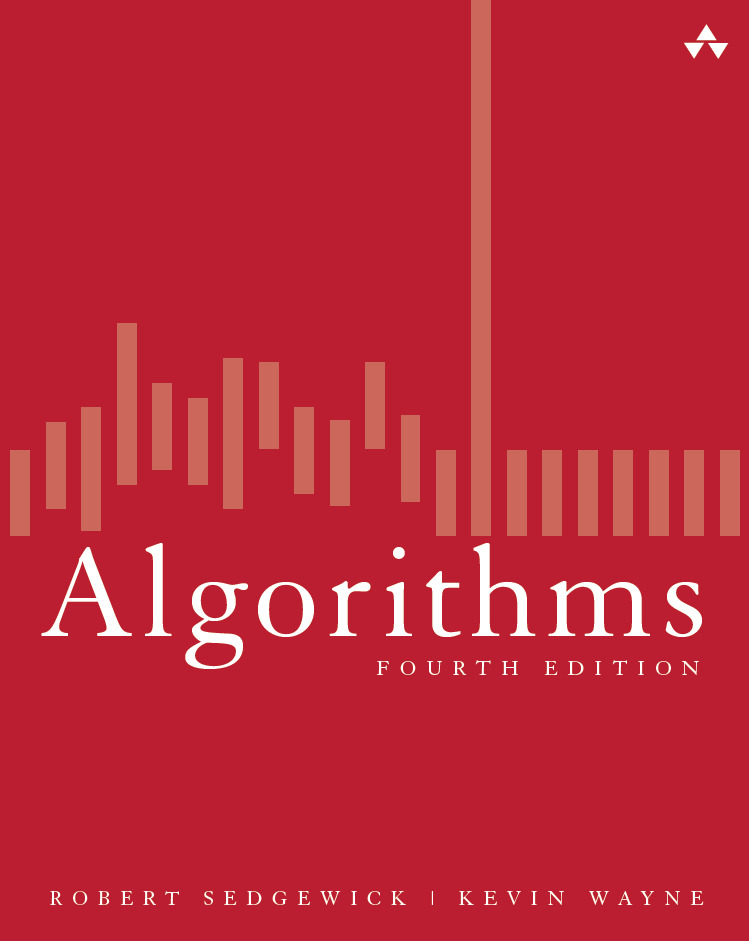
coursera.org -
Learning how to store, represent, and alter data collections while a program is executing is a critical component of learning to program. This Python data structures course is part of the University of Michigan's Python for Everybody Specialization on Coursera. It introduces the Python programming language's fundamental data structures. This is one of the highest rated courses, with a rating of 4.9 and over 500,000 students who have already taken it. The course looks at how they may use the built-in data structures in Python to do increasingly complex data analysis. It is a reasonably short course that takes roughly 19 hours to complete. It covers the following topics:
- Lists
- Dictionaries
- Tuples
Dr. Charles Severance (a.k.a. Dr. Chuck) teaches the course as a Clinical Professor at the University of Michigan School of Information, where he teaches a variety of technology-oriented courses such as programming, database design, and Web development. Dr. Chuck is the well-known author of Python for Everyone.
Key Highlights
- Explain the principles of data structures & how they are used
- Learn to store data as key/value pairs using Python dictionaries
- Learn to use tuples in conjunction with dictionaries to accomplish multi-step tasks like sorting or looping through all of the data in a dictionary
- Create programs that are able to read and write data from files
- Several practice quizzes and graded programming assignments included in the course
- Self-paced learning
Duration : Approx. 19 hours
Google Rating : 4.9/5.0
Enroll here: coursera.org/learn/python-data
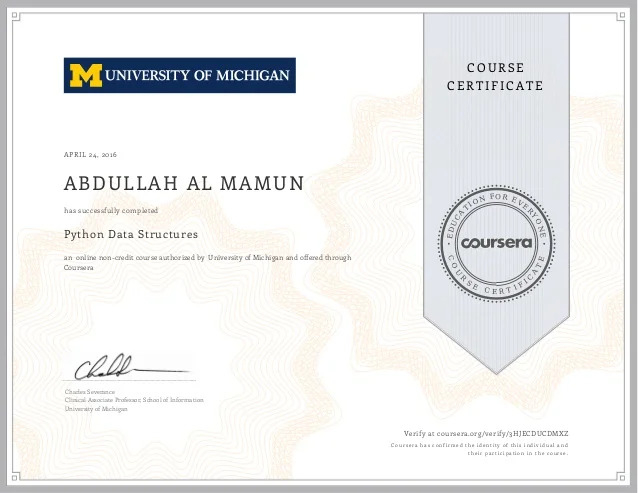
slideshare.net 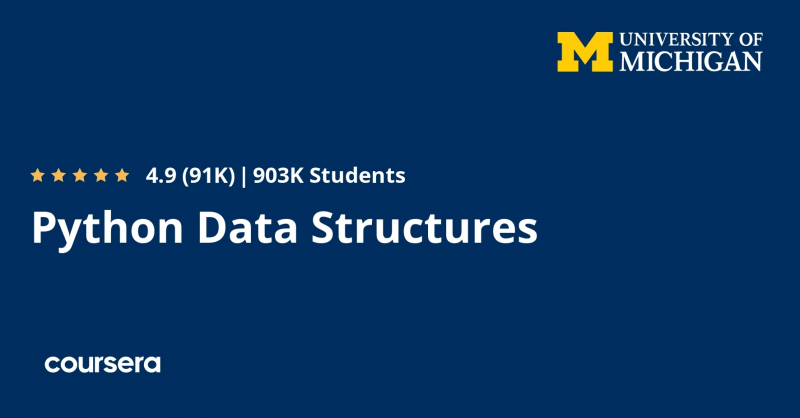
slideshare.net -
Stanford University offers this Coursera Algorithms concentration as a MOOC. Understanding the fundamentals of algorithms and related data structures is required for serious work in practically any field of computer science. As a result, Stanford has included a variation of this course in the curriculum of every Computer Science degree program - bachelor's, master's, and PhD.
Instead of getting into mathematical details and low-level implementation right away, this specialization introduces learners to algorithms and focuses on conceptual understanding. It aids in the development of participants' programming and thinking skills, preparing them to pursue serious software engineering, ace technical interviews, and study more difficult themes in algorithms. There are 4 courses in this program that cover following topics:- Asymptotic (“Big-oh”) notation, sorting and searching algorithms
- Master method for analyzing divide and conquer algorithms
- QuickSort algorithm and its analysis
- Data structures like heaps, balanced search trees, hash tables, bloom filters
- Dijkstra’s shortest-path algorithm
- Breadth-first and depth-first search and its applications
- Greedy algorithms (scheduling, minimum spanning trees, clustering, Huffman codes)
- Dynamic programming (knapsack, sequence alignment, optimal search trees)
- Shortest paths algorithms (Bellman-Ford, Floyd-Warshall, Johnson)
- NP-complete problems and exact and approximation algorithms for them
- Local search algorithms for NP-complete problems
- Strategies for coping with computationally intractable problems like analysis of heuristics
These courses contain a variety of assessments, ranging from multiple-choice quizzes at the end of each module and course to weekly programming assignments in which students must implement the algorithms taught in the lesson in a programming language of their choice. It is assumed that students are familiar with at least one programming language (like C, Java or Python).
Key Highlights
- Master the fundamentals of the design and analysis of algorithms
- Content covered is rigorous but emphasizes the big picture and conceptual understanding
- Taught by Prof. Tim Roughgarden, a renowned and award-winning professor of Computer Science at Stanford University
- One of the highest rated algorithms course on Coursera
- Appeared on various top MOOCs of all time lists
Duration : 16 weeks, 3 hours per week
Google Rating : 4.8/5.0
Enroll here: coursera.org/specializations/algorithms
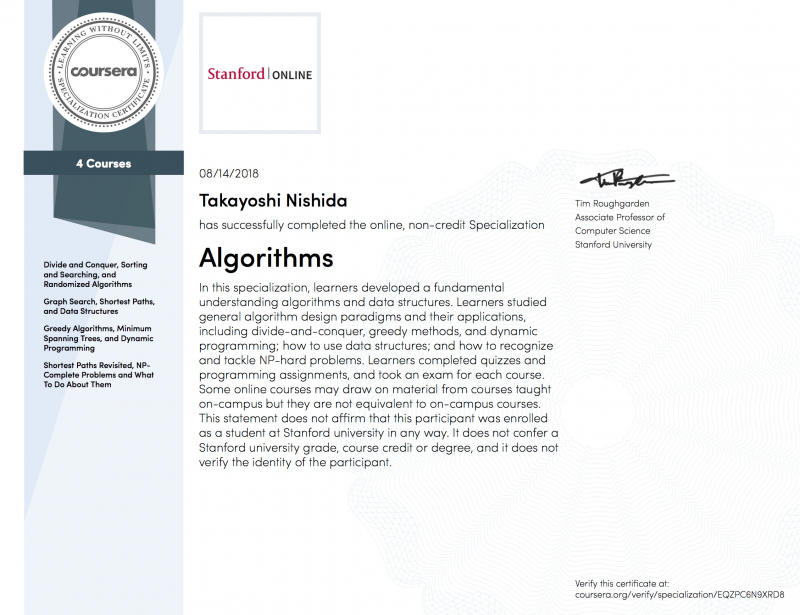
takp.me 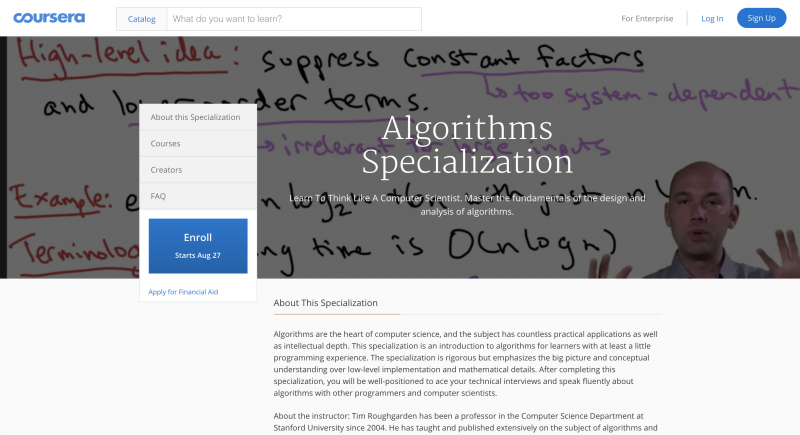
takp.me -
The University of California, San Diego offers an eight-course Algorithms and Data Structures curriculum on edX. Its goal is to assist students in mastering algorithmic programming skills and obtaining employment. Because the emphasis of this curriculum is on learning through application, course designers have spent thousands of hours building over one hundred algorithm tasks. Learners address various computational difficulties by implementing these algorithmic coding challenges in their preferred programming language. The 8 courses in this program cover the following topics:
- Algorithmic Design and Techniques – Learn how to design algorithms, solve computational problems and implement solutions efficiently.
- Data Structures Fundamentals – Learn about data structures that are used in computational thinking – both basic and advanced.
- Graph Algorithms – Learn how to use algorithms to explore graphs, compute shortest distance, min spanning tree, and connected components.
- NP-Complete Problems – Learn about NP-complete problems, known as hard problems that can’t be solved efficiently, and practice solving them using algorithmic techniques.
- String Processing and Pattern Matching Algorithms – Learn about pattern matching and string processing algorithms and how they apply to interesting applications.
- Dynamic Programming – Learn how dynamic programming and Hidden Markov Models can be used in machine learning and genomics to compare genetic strings and uncover evolution.
- Graph Algorithms in Genome Sequencing – Learn how graphs are used to assemble millions of pieces of DNA into a contiguous genome and use these genomes to construct a Tree of Life.
- Algorithms and Data Structures Capstone Project – Synthesize your knowledge of algorithms and biology to build your own software for solving a biological challenge.
The MicroMasters program offers learners a credential for career advancement at Rochester Institute of Technology (RIT) upon successful completion of the seven courses and the Capstone Project. If a learner applies for admission to the RIT’s Master of Science in Professional Studies program at as part of the university’s School of Individualized Study (SOIS), and is accepted, the edX MicroMasters program certificate will count towards 25% of the coursework required the M.S. degree at RIT.
Key Highlights
- Understand essential algorithmic techniques and apply them to solve real life computational problems
- Abundant programming challenges to help students land a top software engineering job
- Implement programs that work in less than one second even on massive datasets
- Prove correctness of an algorithm and analyze its running time
- Get tips and tricks to teach learners best coding practices
Duration : 9 months, 8-10 hours per week
Google Rating : 4.7/5.0
Enroll here: edx.org/micromasters/ucsandiegox-algorithms-and-data-structures
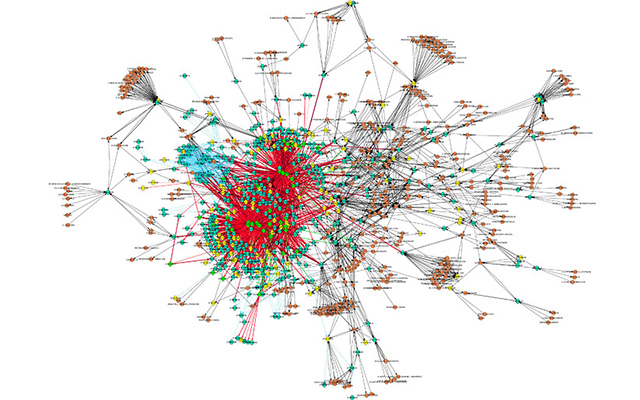
micromasters.ucsd.edu 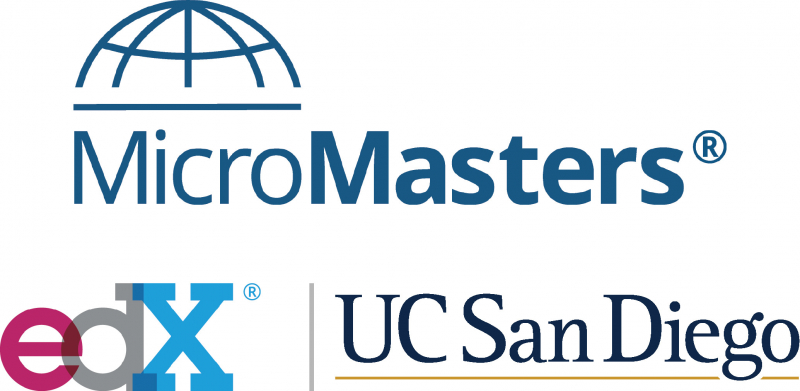
micromasters.ucsd.edu -
Accelerated Computer Science Fundamentals Specialization ranks 5th in the list of best online Data Structures and Algorithms courses. The University of Illinois at Urbana-Coursera Champaign's Specialization teaches fundamental computer science algorithms and data structures. It is a three-course curriculum designed by computer science professor Wade Fagen-Ulmschneider to provide students with a performance pathway into computers and data science. The following subjects are covered in the three courses. C++ is the programming language used to implement the data structures and algorithms covered in these courses.
- Practical programming techniques, including object-oriented programming in C++ and its Standard Template Library, for production-level programming of efficient software applications.
- Basic data structures including arrays, linked lists, stacks and queues, trees, heaps, hash tables, and graphs, as well as efficient algorithms for constructing, searching, and optimizing these structures.
- Analysis of asymptotic running time and memory utilization of the algorithms used on these data structures.
The program is full of coding challenges that require students to write C++ code fragments in a web based interface. Each course also includes 2 projects where students implement C++ programs to perform tasks such as editing images, efficiently manipulating data structures, or solving a graph search problem.
Illinois University's Department of Computer Science is frequently regarded as one of the world's best computer science departments. This specialization assists potential Online Master of Computer Science (MCS) and MCS in Data Science applicants in preparing for the Online MCS Entrance Exam. Learners in this specialization learn the requisite skills in object-oriented programming, algorithms, and data structures to be prepared for advanced study in graduate-level CS curriculum at the University of Illinois, as well as to improve their admissions application.
Key Highlights
- Excellent for learning data structures and algorithms in C++
- Provides a solid foundation for students interested in advanced computer science study
- Learn to define object-oriented classes that encapsulate data structures and algorithms
- Analyze the running time and space needs of an algorithm, asymptotically to ensure it is appropriate at scale, including for big data
Duration : 3 months, 5 hours per week
Google Rating : 4.7/5.0
Enroll here: coursera.org/specializations/cs-fundamentals
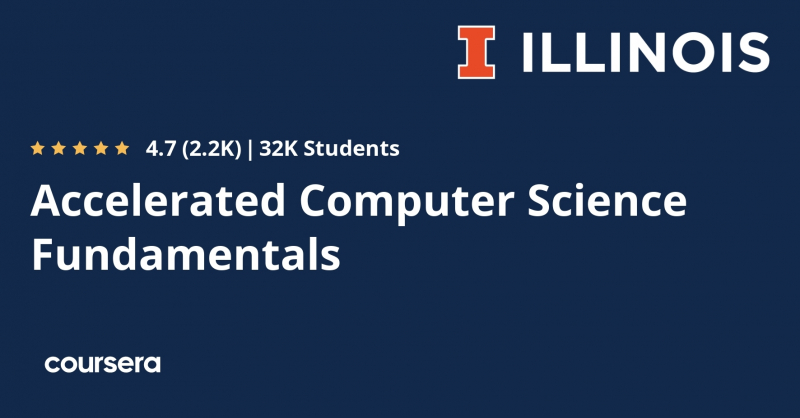
coursera.org 
blog.coursera.org -
This is the most popular and finest coding interview course on Udemy for developers and programmers. It teaches the essential building blocks of computer science, which gives students a significant advantage during interviews. The purpose of this course is to advance participants' programming skills by teaching the principles and core ideas, as well as conducting exercises and problems step by step, so that learners understand why and how things work under the hood. This course combines two courses into one:
- First part is computer science theory and technical coding interview problems. Here students learn data structures, algorithms and Big O notation from scratch. They also learn how to analyze problems using Dynamic programming. Each section has several real life interview problems that have been selected based on importance from big tech company interviews.
- Second part is non-technical interview preparation. There are sections that take students from how to get more interviews; how to format resume, portfolio, LinkedIn and GitHub profiles; how to answers common non-technical questions; how to handle offers and negotiate a raise.
Learners will have lifetime access to over 200 video lessons, as well as cheat sheets on resumes, interview difficulties, and step-by-step directions on how to conduct a whiteboard interview. Everything taught in this course is not particular to any programming language. Although JavaScript is used to explain code, all of the principles and questions you learn are applicable to any programming language. As a result, the course presupposes that students have a fundamental familiarity of at least one programming language. Andrei Neagoie, a senior software developer who has counseled and worked with some of Silicon Valley's largest IT organizations, is teaching the course. His courses are among the most popular on Udemy.
Key Highlights
- Learn, implement, and use different Data Structures
- Learn, implement and use different Algorithms
- The strategies, lessons and exercises in this course greatly help learners land offers from big tech companies
- Be able to write code that runs faster and use low memory
- Become more confident and prepared for your next coding interview
- Excellent fit for self-taught developers to learn the fundamentals of algorithms and data structures to get on the same level as someone with computer science degree
- Get access to private online chat community with thousands of developers online
Duration : 19 hours on-demand video
Google Rating : 4.7/5.0
Enroll here: udemy.com/course/master-the-coding-interview-data-structures-algorithms/
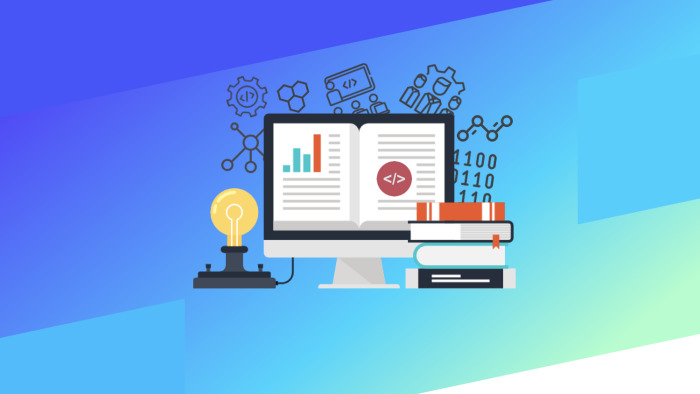
classcentral.com -
JavaScript Algorithms and Data Structures Masterclass ranks 7th in the list of best online Data Structures and Algorithms courses. Colt Steele's course on algorithms and data structures in Javascript is one of the most highly rated and reviewed courses on Udemy. If you want to ace a coding interview, become a better programmer, or enhance your problem-solving skills, this course is a wonderful fit because it focuses on establishing a thorough computer science foundation that will allow you to solve any computational problem.
Months of computer science and interview prep material are compressed into around 22 hours of video courses. Colt based the curriculum of this course on his in-person coding bootcamps, which have helped several of his students land interviews at major corporations such as Google, Tesla, Amazon, and Facebook. The course starts with the basics and then gradually covers advanced topics like Heaps, Graphs etc. It teaches the following topics:- How to assess your own code and compare algorithms as far as time and space complexity is concerned using Big O notation
- Details of Recursion
- Five step approach to solving any coding problem
- Programming patterns and interview strategies
- Dozens of algorithms including searching and sorting algorithms
- More than 10 data structures and how to implement them from scratch
- How to traverse trees and graphs
- Dijkstra’s Shortest Path Algorithm
- Dynamic Programming
This is a highly interactive course with over 85 coding exercises in which students are expected to try out every problem before the lecturer talks them through solution alternatives. It comprises 32 articles and 80 downloadable resources in addition to video lectures.
Key Highlights
- Best Udemy course to learn data structures and algorithms in JavaScript
- Master common problem solving patterns
- Learn everything you need to crack difficult programming interviews
- Cover 6 different sorting algorithms: bubble sort, selection sort, insertion sort, quick sort, merge sort, and radix sort
- Implement over 10 data structures including stacks, queues, linked lists, trees, heaps, hash tables, and graphs
- A complete solution walkthrough video as well as accompanying solution file for every single problem included in the course
- Learn helpful tips and tricks to solve common algorithmic problems
Duration : 21.5 hours on-demand video
Google Rating : 4.7/5.0
Enroll here: udemy.com/course/js-algorithms-and-data-structures-masterclass/
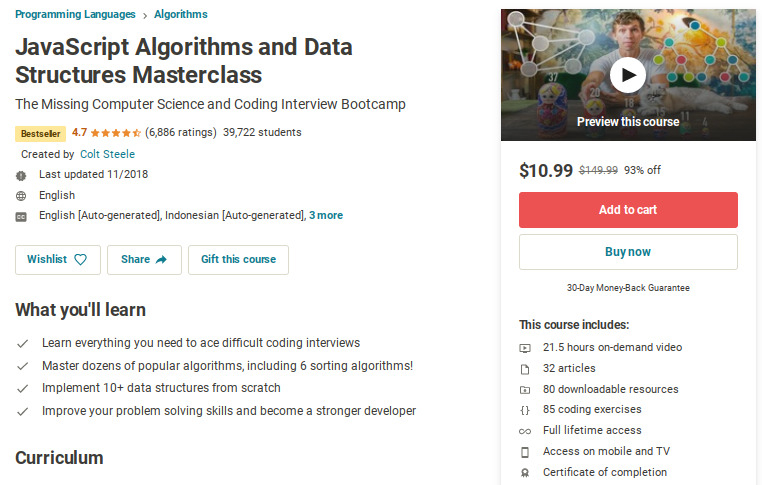
benzinga.com 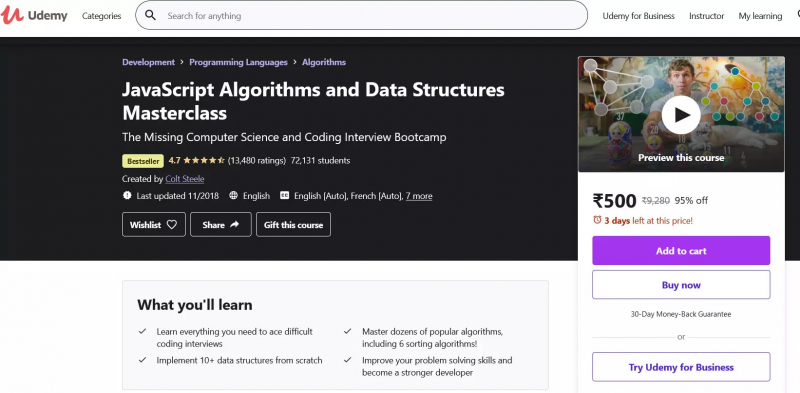
theyuvas.com -
This is the most thorough and immersive course on data structures and algorithms in C and C++, with over 56 hours of video sessions. It concentrates on three elements of data structure learning: comprehending the theory and concepts, analyzing data structures and performing various operations on them, and creating data structures in C and C++. The course begins with a review of fundamental C and C++ topics. It covers the following data structures and algorithmic topics:
- Recursion
- Arrays Representations
- Array ADT
- Matrices
- Sparse Matrix and Polynomial Representation
- Linked Lists
- Stacks
- Queues
- Trees
- Binary Search Trees
- AVL Trees
- Heaps
- Graphs
- sorting Techniques
- Hashing Technique
- Asymptotic Notations like Big O, Omega, Theta
Abdul Bari, the course instructor, digs deeply into each topic, using Whiteboard to write each line of code and explain it in an easy-to-understand manner. He examines, analyzes, and builds each data structure using line-by-line coding.
This course needs students to have a basic understanding of C and some familiarity of C++ concepts such as classes and objects. It is ideal for aspiring or current programmers who wish to properly grasp data structures and use them in the development of applications.Key Highlights
- Learn a variety of data structures and their algorithms, and be able to choose the best data structure for your data and applications
- Practical demonstrations using both C and C++ programming languages
- Learn Recursive Algorithms on Data Structures
- Learn about various Sorting Algorithms
- Build confidence to take up any challenging coding problem using Data Structures
- Source code of all programs and exercises is available for download
Duration : 56.5 hours on-demand video
Google Rating : 4.6/5.0
Enroll here: udemy.com/course/datastructurescncpp/
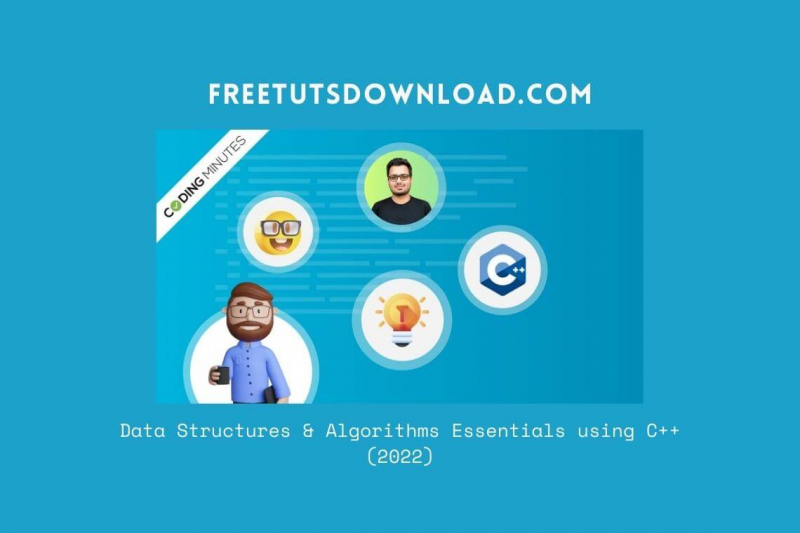
freenulledworld.com -
Data Structures and Algorithms is a Nanodegree program offered by Udacity. Students in this curriculum learn data structures and algorithms, as well as how to apply them to a variety of real-world issues. It is a hands-on program that is strong on algorithms and includes over 100 practice problems. There are following 4 courses in this nanodegree program:
- Welcome – This is a program overview and a Python refresher. Here students deconstruct a series of open-ended problems into smaller components (eg. inputs, outputs, series of functions).
- Data Structures – It covers different data structures, and methods used to manipulate these data structures. It explores the advantages and applications of different data structures. Here students solve a series of open-ended practice problems such as LRU Cache, Private Blockchain, File Recursion, and many more.
- Basic Algorithms – It covers basic algorithms such as searching and sorting on different data structures and how to implement these algorithms using both recursion and without recursion. Here students work on a series of real-world open-ended problems, such as request routing for a web server, search-term auto-completion and Fibonacci heap.
- Advanced Algorithms – It covers advanced algorithms such as brute-force greedy algorithms, graph algorithms and dynamic programming which optimizes recursion by storing results to sub problems. Here students implement a route planner algorithm to calculate the shortest path between two points on a map (like the one used in Google Maps).
Because you will be utilizing Python to construct the algorithms in this program, Udacity expects you to have intermediate level mastery of the Python programming language as well as basic algebra expertise.
Key Highlights
- Learn to evaluate and assess different data structures and algorithms for any real-world problem and implement a solution based on your design choices
- Great course to ace technical coding interviews
- Learn to examine the efficiency of various data structures and algorithm implementations
- Over 100 data structures and algorithm exercises for full hands-on practice
- Personal mentor support to help prepare learners for interviews and on-the-job scenarios
- Complete flexibility to learn at your own pace and schedule
Duration : 4 months, 10 hours per week
Google Rating : 4.6/5.0
Enroll here: coursedrive.org/udacity-data-structures-and-algorithms-nanodegree-download/
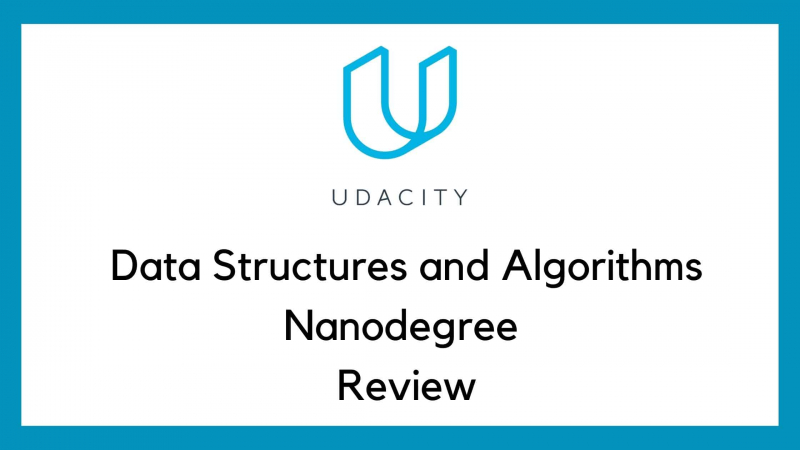
onlinecoursetutorials.com 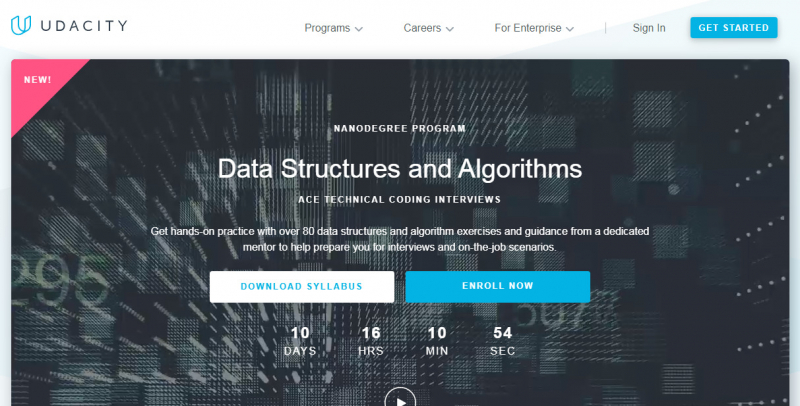
mltut.com -
The University of California, San Diego and the National Research Institute Higher School of Economics also offer this algorithm and data structure expertise. Students learn the theory underlying algorithms, implement them in a programming language of their choice, and use them to solve actual problems in this curriculum, which offers a nice blend of theory and practice. The program consists of six courses, beginning with theory and basic algorithmic approaches and progressing to sophisticated algorithms and complexity. It includes the following topics:
- Using data structures in various computational problems
- Graph data structure
- Algorithms on graphs
- Algorithms on strings
- Advanced algorithmic concepts like Network flows, linear programming and NP-complete problems
This data structures and algorithms course is based on the principle of learning by doing. Each module has 1-2 hours of video lectures, some embedded quizzes, and code answers to the problem set. The program's main focus is a particularly designed 100 algorithmic coding challenges that enable a learner become an expert in algorithmic design. The solutions to these difficulties are automatically validated against 15+ test cases. These teach students how to create, test, and debug fast algorithms that solve huge and challenging problems in seconds.
Another noteworthy feature is that this program is language-independent. Every lesson contains pseudocode, and students must transform what is conceptually set out into code. This significantly improves their competence and learning. Big Networks (which involves finding Shortest Paths in Road Networks and Social Networks using algorithms that are thousands of times quicker than traditional ones) and Genome Assembly are two real-world projects included in the specialization (which involves bioinformatics algorithms to assemble a genome from millions of short DNA fragments).
Key Highlights
- Most popular data structures and algorithms course on Coursera with more than 142,000 students enrolled at the time of writing
- Understand basic algorithmic techniques such as greedy algorithms, binary search, sorting and dynamic programming and how to use them to solve programming problems
- Learning how to design test cases and automate them
- Learn how assembly algorithms fuel recent developments in personalized medicine
- Learn to apply graph and string algorithms to solve real-world challenges
- Understand data structures such as stack, queue, hash table, priority queue, binary search tree, graph and string and use them to solve problems
- Explore advanced techniques such as maximum flow, linear programming, approximate algorithms, SAT-solvers, streaming
- Flexibility to code problems in one of the following programming languages: Java, C, C++, Python2, Python3, C#,
- Haskell, Javascript, Ruby, Scala
Duration : 6-8 months, 6 hours per week
Google Rating : 4.6/5.0
Enroll here: coursera.org/specializations/data-structures-algorithms
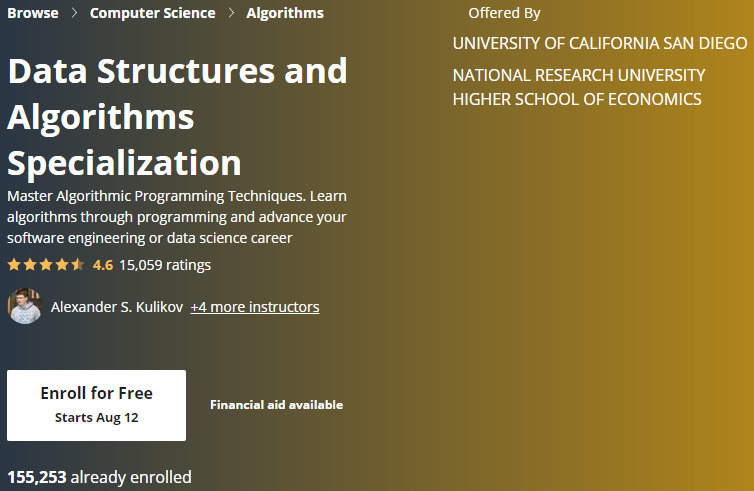
downloadly.net 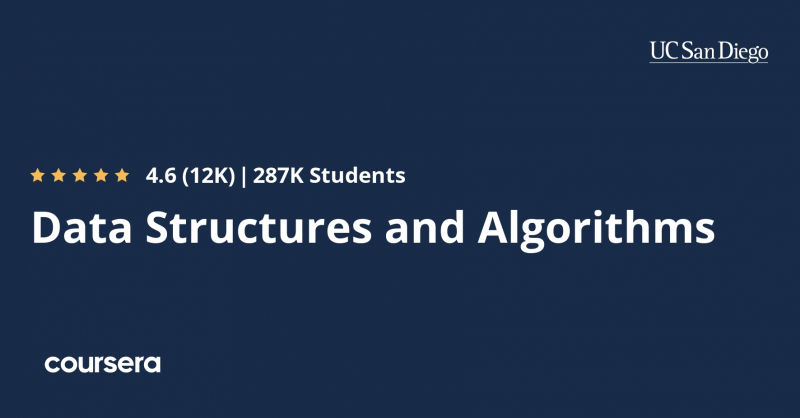
coursera.org -
Jose Portilla, who has taught thousands of students about Python programming and data science, is offering this Udemy data structures and algorithms course. He built this course to help students prepare for coding interviews at major IT companies. It is essentially a three-in-one course that covers Python data structures and algorithms, technical coding interview questions and solutions, and non-technical interview preparation such as resume checks and in-person interview prep. The course content is divided into 200+ video lectures that explain a certain topic and are complemented with a notebook containing written code and explanations. The course mostly focuses on the following:
- Non-technical interview preparation – covers creating resume, creating LinkedIn and Github profiles, post-interview topics related to salary negotiation and references preparation)
- Data Structures and Algorithms – covers algorithm analysis and Big-O notation, array sequences, stacks queues and deques, linked lists, recursion, trees, searching and sorting algorithms, graph algorithms etc.
- Practice interview coding problems
- Tech company mock interviews
This course is ideal for Python students and professionals who want to learn about data structures and algorithms while simultaneously preparing for technical interviews.
Key Highlights
- Learn all major Data Structures and Algorithms
- Create a LinkedIn and Github profile for recruiters to find
- Build and leverage a network for job opportunities
- Access to discussion forums and community of students
- Mock interviews to prepare students better for the real technical coding interviews
- Full lifetime access to all video lectures, articles and downloadable resources and future updates
- 30 day money back guarantee from Udemy
Duration : 16.5 hours on-demand video
Google Rating : 4.5/5.0
Enroll here: udemy.com/course/python-for-data-structures-algorithms-and-interviews/
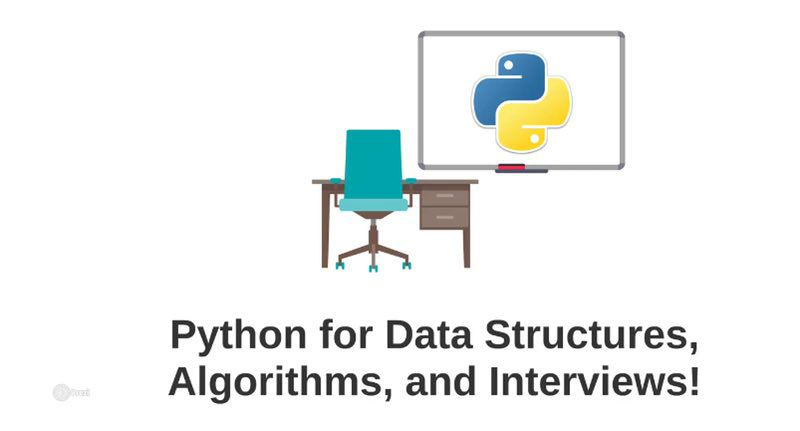
github.com 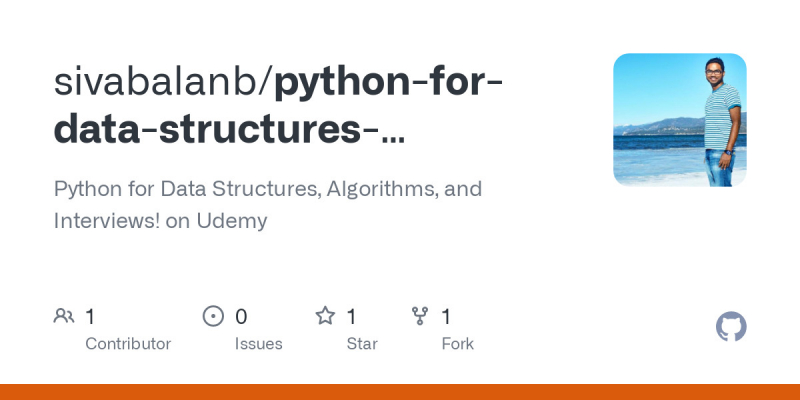
brettterpstra.com -
Algorithms are the fundamental building blocks of computer programming. They provide a technique to think about programming problems in plain English before translating them into a specific language such as Python, C, or JavaScript. This Algorithms course explains some of the most popular and effective algorithms for finding and sorting information, dealing with techniques like as recursion, and comprehending typical data structures. Following topics are covered in the course:
- Common data structures like arrays, linked lists, stacks and queues, hash tables etc.
- Recursion, power and factorial
- Data sorting algorithms like bubble sort, merge sort, quicksort
- Data searching algorithms like ordered list search, unordered list search, determine if a list is sorted
- Several other advanced algorithms
- Measuring Algorithm performance
Joe Marini teaches this Algorithms course. He has been programming professionally for over 30 years for organizations such as Adobe, Microsoft, and Google. He has spoken at industry conferences and written various books and papers about web and software development.
This Algorithms class requires students to be familiar with basic programming ideas and to be comfortable writing and debugging code in a text editor. The Python programming language is used in this course to walk through the exercises. None of the algorithms learned are Python-specific, so folks who are unfamiliar with Python but are familiar with another programming language can simply follow along. However, having some basic Python programming expertise will be advantageous.Key Highlights
- Learn most of the popular algorithms and related data structures
- Learn performance implications of different algorithms and understand how to evaluate the performance of a given algorithm
- Learn to implement the algorithms in Python programming language
- All exercise files available for download
- Concepts taught can be applied to any programming language
- One-month free trial available
Duration : Self-Paced
Google Rating : 4.5/5.0
Enroll here: linkedin.com/learning/programming-foundations-algorithms
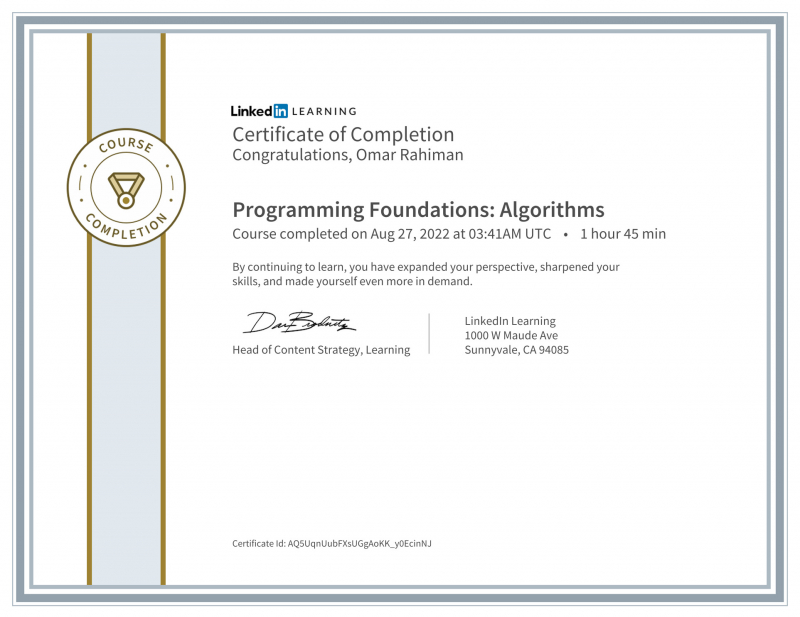
linkedin.com 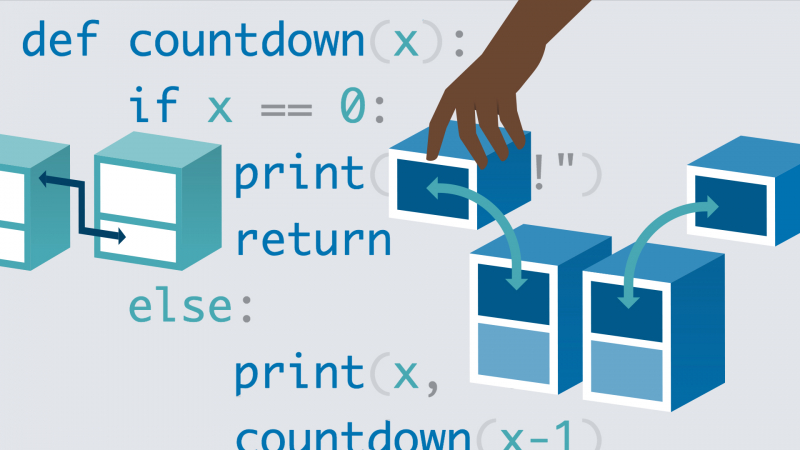
linkedin.com -
This Java data structures and algorithms course by Tim Buchalka and his team is one of the best on Udemy. It focuses on the implementations of data structures and algorithms rather than merely theory to provide learners a thorough knowledge of how things function. What distinguishes this course is that it devotes significantly more time to exploring what is accessible in the JDK, allowing students to better grasp how things work behind the hood and apply this knowledge to their own future programming projects. The following subjects are covered in the course:
- Big O notation
- Arrays
- Linked Lists
- Binary trees, balanced trees like AVL trees and Red-black trees
- Stacks
- Queues
- Hashtables
- Heaps including heapsort algorithm
- Associative arrays
- Dictionaries
- Graph algorithms
- Sort algorithms
- Search algorithms
This course is perfect for students who have some Java programming experience and want to learn more about data structures and algorithms. Even experienced developers will benefit from this training. Those looking for their first or next better programming job, or who want to work as a freelance software developer, would also profit greatly from this training.
Key Highlights
- Highly rated and most subscribed Udemy course in data structures and algorithms using Java programming language
- Get a complete and concrete understanding of most popular and well used data structures and be able to confidently use them in your day to day java programming
- Learn what’s available in the JDK for storing and sorting data
- Code an implementation of each data structure
- Learn many of the algorithms commonly used to sort data, so your applications will perform efficiently when sorting large datasets
- Complete source code is included and is available for download
Duration : 16 hours on-demand video
Google Rating : 4.5/5.0
Enroll here: udemy.com/course/data-structures-and-algorithms-deep-dive-using-java/
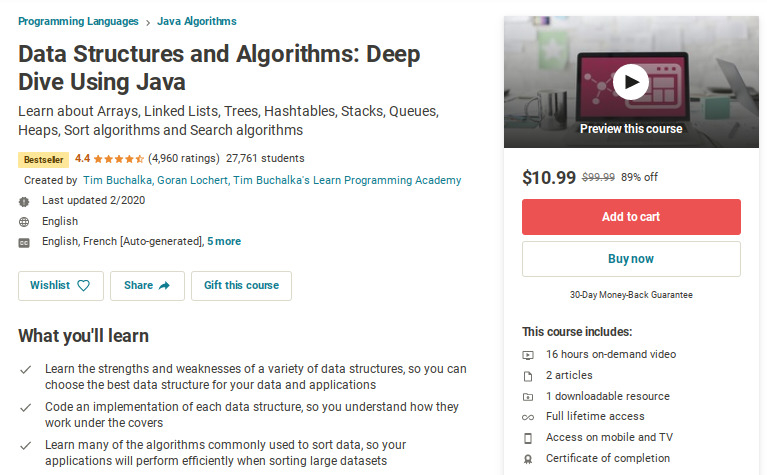
benzinga.com


















